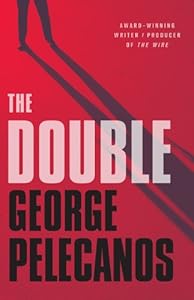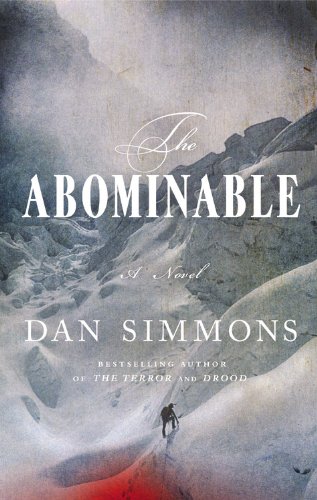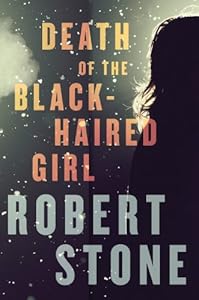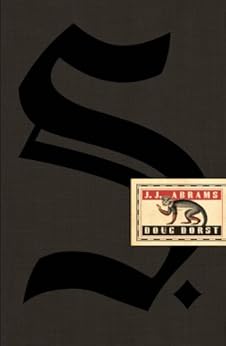 How are things going so far? I hope the list of books you want to read this fall is filling up or overflowing so a few months from now, we don't need to have a philosophical discussion about glass half-empty or half-full.
How are things going so far? I hope the list of books you want to read this fall is filling up or overflowing so a few months from now, we don't need to have a philosophical discussion about glass half-empty or half-full.We Material Witnesses are unashamed book junkies, and we could talk about upcoming books forever, but that wouldn't give you or us any time to actually read. I was only going to list a few more books, but the oddest thing happened: the covers were all shades of black and white, and I started wondering what the heck, am I now viewing the world in the same way as my dogs? So I added a couple more colorful covers and had to wrestle myself to the ground so I could stop. Let's get to it.
 I hope you have some book-loving friends, who have such a keen understanding of your reading preferences, they're constantly tossing you amazing titles. Sister Mary's husband and I share some reading tastes, and, of course, so do Sister Mary and I. She recently steered me to Javier Marías's The Infatuations, which was translated from the Spanish by Margaret Jull Costa, and published by Alfred A. Knopf on August 13. I read three pages and then ran pell-mell to my computer to order more books by this sensational Spanish writer.
I hope you have some book-loving friends, who have such a keen understanding of your reading preferences, they're constantly tossing you amazing titles. Sister Mary's husband and I share some reading tastes, and, of course, so do Sister Mary and I. She recently steered me to Javier Marías's The Infatuations, which was translated from the Spanish by Margaret Jull Costa, and published by Alfred A. Knopf on August 13. I read three pages and then ran pell-mell to my computer to order more books by this sensational Spanish writer.I'll tell you more about it at another time, but for now, narrator María Dolz overhears a conversation that makes her question her assumptions about her lover and his murdered friend—the victim of a random street crime and half of a couple she had considered perfect. The novel examines guilt and obsession, loss and grief, and the glimmering, shifting, subjective shape of truth. Marías's beautiful writing creates what seem like actual thoughts crystallizing on the page, and it makes conversations as suspenseful as action in a heart-pounding thriller. Its long, looping sentences or stuttering little fragments; abrupt breaks for chapters; many digressions; and metafictional reflections make The Infatuations not for everybody, but if it sounds like something for you, read it now, so when Marías receives a Nobel, you can say he deserves it.
 Writers Michael Connelly and George Pelecanos inspire strong loyalty, and I'm one of their fans. In addition to enjoying their characters and plots, I look forward to and love the many references to pop culture (music, literature, movies, fashion, and sports), local politics, and news that vividly evoke time and place. The setting of Pelecanos's hardboiled series and standalones is Washington, DC working-class neighborhoods and businesses.
Writers Michael Connelly and George Pelecanos inspire strong loyalty, and I'm one of their fans. In addition to enjoying their characters and plots, I look forward to and love the many references to pop culture (music, literature, movies, fashion, and sports), local politics, and news that vividly evoke time and place. The setting of Pelecanos's hardboiled series and standalones is Washington, DC working-class neighborhoods and businesses.The Double (Little, Brown, October 3) is Pelecanos's second book (after The Cut) featuring Spero Lucas, a young Iraq War veteran now working as a special investigator for a defense attorney. Occasionally, Spero takes on private-client "salvage" jobs similar to those done by John D. MacDonald's knight errant, Travis McGee. Now, in addition to the murder he's working on for the attorney, Spero is looking for a valuable painting ("The Double"). It was stolen from his client by her sociopathic ex-boyfriend, who takes more delight in depriving her than in gaining the painting itself.
You may be familiar with Pelecanos from his work on the TV series The Wire and Treme. In this book, he acknowledges writers John D. MacDonald, Charles Willeford, and Don Carpenter, and you'll find elements of their work in The Double.
It's a an unsettling, nonlinear coming-of-age story about good girl Sylvie Mason, bullied at school and left in the care of her inattentive, bad girl older sister Rose, nine months after their parents, devout Christians who worked with "haunted" people, were murdered. Sylvie was the only witness to their shooting inside a church. While a man was arrested for the murders, he has an airtight alibi. Between dealing with school, her sister, the murders, the police, family secrets, and the funny goings-on in the basement, Sylvie has a lot on her plate.
 Fantastic reviews are pouring in for Elizabeth Gilbert's historical fiction, The Signature of All Things, coming from Viking on October 1. What really sells me on the book are Gilbert's interest in learning and science, the fascinating portrait of a 19th-century woman coming into her own, and sumptuous writing. Can't you envision a hummingbird as "a jeweled missile, it seemed, fired from a tiny cannon" and Alma as "ginger of hair, florid of skin, small of mouth, wide of brow, abundant of nose"?
Fantastic reviews are pouring in for Elizabeth Gilbert's historical fiction, The Signature of All Things, coming from Viking on October 1. What really sells me on the book are Gilbert's interest in learning and science, the fascinating portrait of a 19th-century woman coming into her own, and sumptuous writing. Can't you envision a hummingbird as "a jeweled missile, it seemed, fired from a tiny cannon" and Alma as "ginger of hair, florid of skin, small of mouth, wide of brow, abundant of nose"?The book opens with Henry Whittaker, who rises from birth to a poor Kew Garden arborist in London to become the richest man in Philadelphia, but the novel's main focus is on Henry's daughter, Alma, born in 1800. Alma learns Greek and Latin and is interested in the natural world. The fact that she is a woman—and a plain one at that—limits her opportunities. Alma resigns herself to spinsterhood until she meets Ambrose Pike, a botanical illustrator. She studies moss and learns about herself as she travels from Tahiti to Holland, joining other 19th-century amateur explorers and naturalists in making major contributions to science.
 I'm always on the lookout for Asian fiction, and when Della Streetwise told us about Fuminori Nakamura's fast-moving noir (see here), I couldn't wait to add it to crime fiction by Keigo Higashino, Miyuki Miyabe, and Natsuo Kirino. Evil and the Mask, which is translated from the Japanese by Satoko Izumo and Stephen Coates, was actually published in June by Soho Crime. But I tell you about it now because Nakamura's interest in themes used by Mishima, Camus, and Dostoevsky might make this book a good companion for noir fans to read while rain lashes the windows. The next morning, you can ponder how Nakamura's books differ from Western noir. It's a bit like comparing an Akira Kurosawa film with a Coen brothers' movie.
I'm always on the lookout for Asian fiction, and when Della Streetwise told us about Fuminori Nakamura's fast-moving noir (see here), I couldn't wait to add it to crime fiction by Keigo Higashino, Miyuki Miyabe, and Natsuo Kirino. Evil and the Mask, which is translated from the Japanese by Satoko Izumo and Stephen Coates, was actually published in June by Soho Crime. But I tell you about it now because Nakamura's interest in themes used by Mishima, Camus, and Dostoevsky might make this book a good companion for noir fans to read while rain lashes the windows. The next morning, you can ponder how Nakamura's books differ from Western noir. It's a bit like comparing an Akira Kurosawa film with a Coen brothers' movie.At the beginning, Shozo Kiku tells his 11-year-old son, Fumihiro, his fortune. When he is a teen, Fumihiro must become a "personification of evil"; he is next in line to carry on the family tradition of acting as "a cancer on the world." (Misery and warmongering benefits the Kuki family's strong military-industrial ties.) Over the next few years, it becomes clear: If Fumihiro doesn't cooperate, Shozo will ruin Fumihiro's beloved Kaori, whom Shozo adopted for purposes of manipulating his son. It looks like Fumihiro will have to kill his father, but what will becoming a murderer do to his relationship with Kaori? This sounds like positively head-spinning stuff, but I'll give it a whirl.
 One of my sure-fire recipes for happiness is taking a long book on vacation. At the end of an exhausting day, I join my dogs for some contemplation. They gnaw rawhide bones; I nibble on my book, perhaps a Dan Simmons thriller. Simmons often combines alternate history with mystery, myth, and the supernatural, and The Abominable, a 672-page doorstopper to be released by Little, Brown on October 22, looks no different.
One of my sure-fire recipes for happiness is taking a long book on vacation. At the end of an exhausting day, I join my dogs for some contemplation. They gnaw rawhide bones; I nibble on my book, perhaps a Dan Simmons thriller. Simmons often combines alternate history with mystery, myth, and the supernatural, and The Abominable, a 672-page doorstopper to be released by Little, Brown on October 22, looks no different.Simmons seems to have a jones for the bitter cold (The Terror), and he's allowed his poor character Percival Bromley, a British lord, to vanish on Mt. Everest. Surviving on the highest mountain in the world isn't easy today; in 1920, when Bromley disappears, it must have been hell. A rescue expedition is being organized, and American travelogue writer Jake Perry, his friend Jean-Claude, and team leader Deacon prepare with the help of real alpinists of the day. I wish them lotsa luck. Knowing Simmons, they're going to need it.
 |
| This is the Bloomsbury cover |
Fifteen months separate brothers Subhash and Udayan Mitra, born in a middle-class suburb of Calcutta. They are inseparable, even though Subhash is studious and cautious, and Udayan is passionate and rebellious. In 1967, they separate. Udayan joins the Mao-inspired Naxalite movement, and Subhash moves to Rhode Island to earn a Ph.D. and conduct scientific research. Despite the distance, Subhash's life is affected by Udayan's idealism and political activism. Then a crisis sends Subhash back to India.
Lahiri won the Pulitzer Prize for Fiction in 2000 for Interpreter of Maladies. She's a natural storyteller, known for her psychological insights and elegant prose. In The Lowland, she examines the Mitra family in India and America over decades, but I anticipate closing the book, wishing there were more.
 Which writers' new books automatically go on your to-read list? Any of them have books coming out this fall? Some of my automatics are the Pynchon book I told you about on Saturday (Bleeding Edge), Robert Coover's The Brunist Day of Wrath (Dranzc Books, October 15), a ginormous 1,100-page follow-up to his The Origin of the Brunists; the Lethem book below; and the book on the left, Robert Stone's Death of the Black-Haired Girl.
Which writers' new books automatically go on your to-read list? Any of them have books coming out this fall? Some of my automatics are the Pynchon book I told you about on Saturday (Bleeding Edge), Robert Coover's The Brunist Day of Wrath (Dranzc Books, October 15), a ginormous 1,100-page follow-up to his The Origin of the Brunists; the Lethem book below; and the book on the left, Robert Stone's Death of the Black-Haired Girl.Stone is a big name in the world of literary fiction. He first stunned me with Dog Soldiers, the 1974 novel that makes connections between the Vietnam War, the counterculture, and heroin. About the book Houghton Mifflin Harcourt is releasing on November 12, Publishers Weekly says, "With its atmosphere of dread starting on page one, this story will haunt readers for some time."
The story involves a brilliant, but reckless professor, Steven Brookman, who tries to end the affair he's having with a rebellious black-haired student, Maud Stack, because his wife is returning from a trip abroad. When Maud is killed, the shock waves affect everyone around them, including Brookman's wife and daughter, and Maud's dad, a retired cop dying of emphysema.
 Jonathan Lethem is much like Don DeLillo and Michael Chabon, in that they all draw ideas from popular culture, explore future consequences, and let characters drive the plot. Their books straddle genres and are witty, quirky, and thought-provoking (see Periphera's review of Lethem's Motherless Brooklyn here).
Jonathan Lethem is much like Don DeLillo and Michael Chabon, in that they all draw ideas from popular culture, explore future consequences, and let characters drive the plot. Their books straddle genres and are witty, quirky, and thought-provoking (see Periphera's review of Lethem's Motherless Brooklyn here).Lethem's Dissident Gardens (Random House, September 10) is set in Queens, a continuation of Lethem's exploration of New York City (Motherless Brooklyn, The Fortress of Solitude, and Chronic City). It's a complex, nonlinear multigenerational saga centering around two unusual women: Rose Zimmer, an Eastern European Jew and committed leftist, ousted from the American Communist Party in 1955 when she has an affair with a black cop; and her smart daughter Miriam, who loves the bohemian life of Greenwich Village.
 I'll end today's list with a mysterious book. I've been looking forward to J. J. Abrams and Doug Dorst's S. since reading in 2011 that Abrams, writer and producer of TV shows Lost and Alias and director of the recent Star Trek movie, had teamed with novelist Dorst for "a multilayered literary puzzle of love and adventure, sparked by a book of mysterious provenance." Parts of the story will apparently be told through 20-some real-world artifacts, "like an epistolary novel that’s been exploded and scattered."
I'll end today's list with a mysterious book. I've been looking forward to J. J. Abrams and Doug Dorst's S. since reading in 2011 that Abrams, writer and producer of TV shows Lost and Alias and director of the recent Star Trek movie, had teamed with novelist Dorst for "a multilayered literary puzzle of love and adventure, sparked by a book of mysterious provenance." Parts of the story will apparently be told through 20-some real-world artifacts, "like an epistolary novel that’s been exploded and scattered."S. has been kept under wraps, with only a trailer released; the cover was revealed a few days ago. I haven't been able to find any advance reading copy reviews, although Little, Brown/Mulholland is due to bring it out on October 29.
Here's what I know of the plot: Jennifer finds a book left behind by a stranger (Eric). It's enigmatic author V. M. Straka's final novel, Ship of Theseus, "in which a man with no past is shanghaied onto a strange ship with a monstrous crew and launched onto a disorienting and perilous journey." The book contains Eric's margin notes; Jennifer responds with notes of her own and leaves the book for Eric. The young couple thus begin a conversation through the medium of the book that "plunges them both into the unknown." Yipes.
That's it for today. Tomorrow, we'll see what Maltese Condor has to show us.

More great titles! HELP FOR THE HAUNTED and THE ABOMINABLE are already in my TBR stack and S is on my must have as soon as it hits shelves list. I think JJ Abrams is pretty brilliant and I can wait to read this book. (They say it'll be shrink wrapped because of all the stuff stuffed into the book!)
ReplyDeleteI've gotten a kick out of all the secrecy surrounding Abrams and Dorst's S.. When the trailer came out, it was so enigmatic a lot of people didn't understand it was about a book; they thought it might be a new game of some sort.
DeleteChoosing which fall books to write about has been tough. There are SO many good-looking titles coming out or that have been released in the past month. We're posting a list of more books on Thursday, after MC's post tomorrow.
And I'm already excited about winter's offerings!